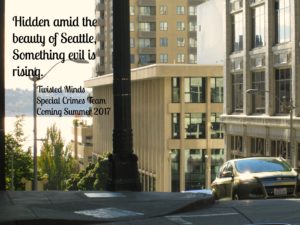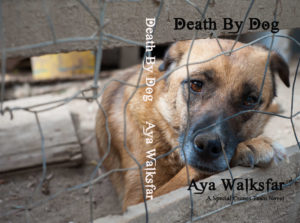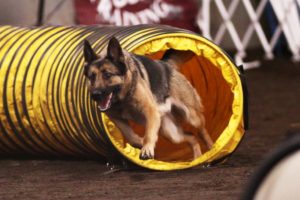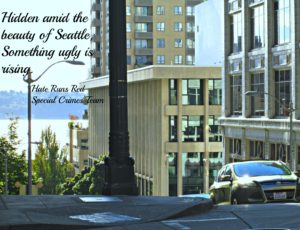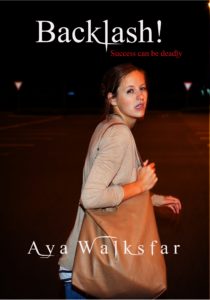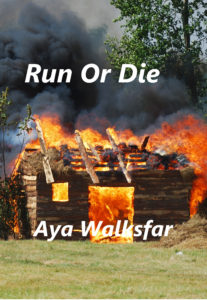COMING AUGUST 1, 2017!

Twisted Minds
Prologue
May 16
Monday 3 a.m.
The light of the half-moon couldn’t conquer the city lights and reach the darkened building. A light pole topped with a halogen lamp stood more than half a block away. The small puddle of dirty-white light barely scratched the surrounding area. At this hour in the morning, Seattle belonged to the homeless and the drunks and the gangs.
This area of Aurora Avenue, however, clung to a desperate civility and the gangs and the whores weren’t very interested in it. Consequently, the night lay undisturbed, except for a homeless man sleeping in a doorway, cuddling his wine bottle. Two figures dressed in dark clothes and full-face ski masks climbed out of an old beater car that hung onto the dull shine of some dark color.
Gravel from the small parking lot crunched beneath their shoes as they made their way to the back door of A Woman’s Place. With a swift kick, the jamb gave way and the door swung inward. The two strode inside with only the blank faces of commercial buildings and sleeping apartment buildings encircling the women’s center to witness the invasion.
As the smaller figure headed through the double doors leading from the kitchen to the open area in front, the sound of breaking dishes filled the air.
After a while, the person walked from the kitchen into the open area and set down three gallon jugs of blood. Ski mask rolled up to the forehead, hands propped on hips, a scowl marred the ordinary face. “This is a piss poor job! What’s wrong with you? You love sand niggers?” Booted feet stomped a plastic truck and gloved hands tore the head from a baby doll then flung it down.
“No! You know I don’t, but the kids…” Panicked eyes flashed to the smashed toys.
The back of a hand lashed across the protester’s cheek. The skin on the cheekbone split and a trickle of blood ran from the wound. “They’re as much a sand nigger as their mommas and daddies. The only way to get rid of lice, my daddy said, was to kill the nits. Get this blood splashed around; and do a decent job this time.”
Once the jugs were empty, the two figures tossed them to the floor and headed toward the kitchen. The double doors from the kitchen swung open and an elderly woman walked in.
Dark eyes blazed from a walnut brown face. She studied the pale faces not yet hidden again behind the rolled up ski masks. “You’ve done evil this night. May Allah have….”
Before the old woman completed the sentence, a fist slammed into her face. Her cheekbone shattered from the impact as she fell toward the sharp corner of one of the children’s broken tables.
Chapter 1
May 16
Monday 6:30 a.m.
The sun crept up behind the buildings surrounding A Woman’s Place, rimming them with a slightly golden halo. With the temperature close to fifty-six degrees and a cloudless blue sky it promised to be a pleasant day. Ahead of Zahair Abidi, a crowded metro bus squealed to a halt at the bus stop a few feet away from the plate glass windows of the one-story, beige stucco building. More people squeezed onboard as Zahair eased around the bus.
She frowned as she drove past the front of A Woman’s Place. I’m certain I forgot to let down the blind on the far right when I closed up; worried about it until I finally went to bed last night, but now it’s down. Oh, well, all that worry for nothing. I must’ve gone back and closed it after talking to Randy when he delivered the milk.
With a flick of her turn signal, she entered the narrow alley between the center and an abandoned grocery store. The small gravel lot in back offered parking to the staff of A Woman’s Place. A four-foot tall cyclone fence enclosed the other two-thirds of the building’s extra-large lot space. It held a patch of grass, a swing set, a slide, and a sandbox for the children in the daycare that A Woman’s Place ran.
As she swung her compact car into its marked spot, Zahair’s eyes flashed to the dumpster next to the back door, but the old woman wasn’t sleeping next to the metal bin this morning. She probably found some place else to sleep last night. Hope she comes to breakfast a little bit later. I worry so about her.
Nonexistent spiders crawled across her neck and she peered around. Lately, at the oddest moments, she felt invisible eyes watching her. Pushing away the uncomfortable thought, she hopped out, grabbed her purse, and dug through it for the center’s keys as she walked to the kitchen door. Keys in hand, she lifted her eyes to the deadbolt and froze. The doorjamb around the lock had been split. The door hung open a fraction of an inch.
Her heart slammed against her ribs. From the front of the building, a bus pulled away from the curb. She stifled the sudden urge to race out to the sidewalk and flag it down. With one finger, she shoved against the door. It opened on well-oiled hinges. Straining, she listened for the slightest sound. Silence. She shook off the unnamed dread that chased goosebumps down her arms. Easing the door wide, she slipped inside.
The ordered kitchen lay in disarray. Stainless steel pots from the overhead rack scattered across the once-immaculate tile floor. The refrigerator hummed, its door gaping. Half-gallons of milk meant to feed the daycare children had been flung across the room. The waxed cartons had split. Puddles of dingy white gathered in the worn spots on the floor.
She stepped forward. Her foot slipped on a paper plate. A gasp burst from between dry lips as she caught her balance. Pieces of elbow macaroni crunched beneath her shoes. A dented can rolled from the touch of her toe. Shards–from their few plates, cups, and glasses–glittered in the light sneaking in through the back door. Cook’s most proud possession, a set of kitchen knives gifted by a store in Seattle, lay amid the detritus.
Biting her lower lip, she held the cry of despair inside her. Caution weighed every step as she shuffled through the spacious kitchen, nudging aside the dented pots and pans, the cooking utensils, and the remnants of the carefully hoarded food.
At the swinging double doors that led into the main room, she halted. The pulse in her throat ramped up. She sucked in a deep breath and mustered her courage. One hand grasping her keys like a weapon, she pushed open the left door.
A sob tore from her throat. Her hand flew to her mouth to hold in the wail of despair that threatened to crash through the spacious room. Slowly, her eyes registered the shattered tables, the smashed toys, the holes in the plasterboard walls so recently painted a vibrant blue, and the blood. So much blood. Dark red streaks smeared across the walls; reddish-brown puddles hardened on the scuffed wood floor. It appeared that what remained of the furnishings had been doused with blood. The smell gagged her. Her stomach flip-flopped.
Someone had dragged in black, plastic garbage bags from the dumpster by the rear door. Egg shells, discarded vegetables, Styrofoam meat trays, empty milk cartons, and crumpled paper towels, lay strewn across the room. The reek of rancid food vied with the rotting odor of blood.
She swallowed hard and prayed for strength, for courage. Still, she couldn’t force her feet to move. Her mind sluggishly tried to process the scene. Tears stung her eyes. She blinked them away. Inhaling a jagged breath, her stomach nearly retched. She reprimanded herself. This was no time to give in to weakness.
All of the blinds were closed. Sunlight, she needed sunlight. With the cloth of her hijab over her nose and mouth to filter out some of the stench, she shuffled forward. From the corner of her eye, in front of what was left of one of the children’s tables, she noted a pile of black rags. More garbage, she thought. Then the black rags moved and a low moan issued from them.




